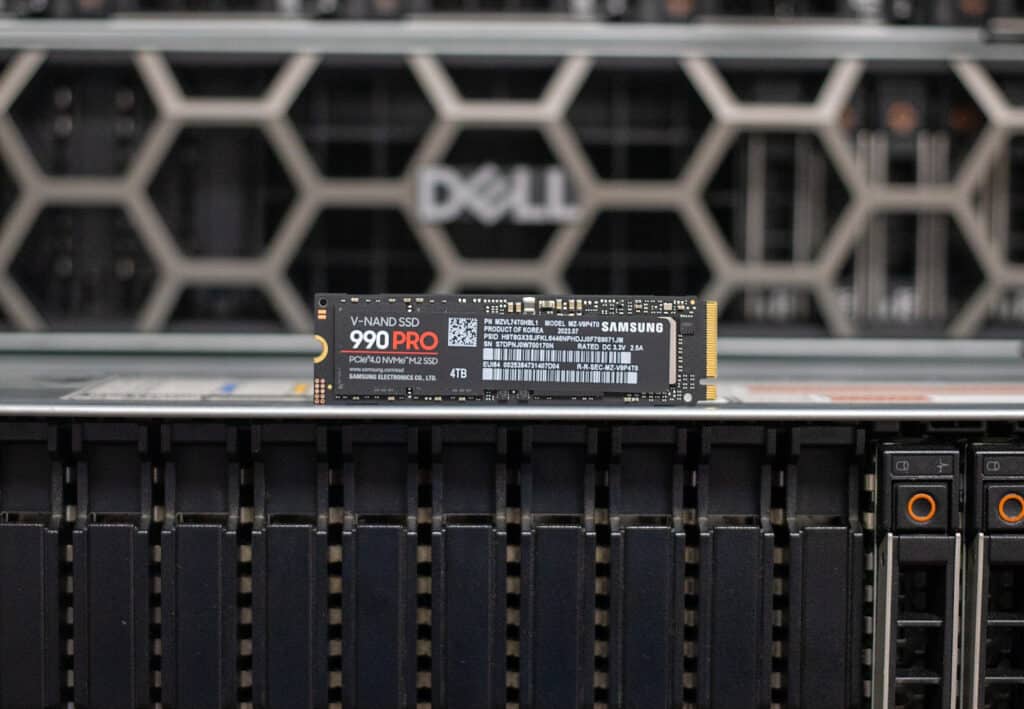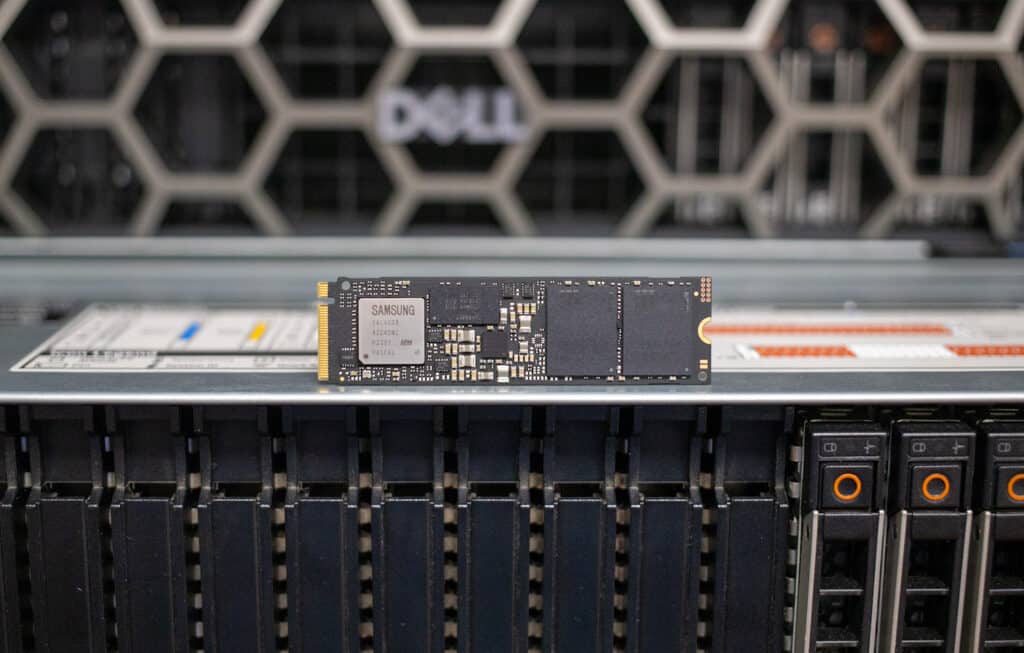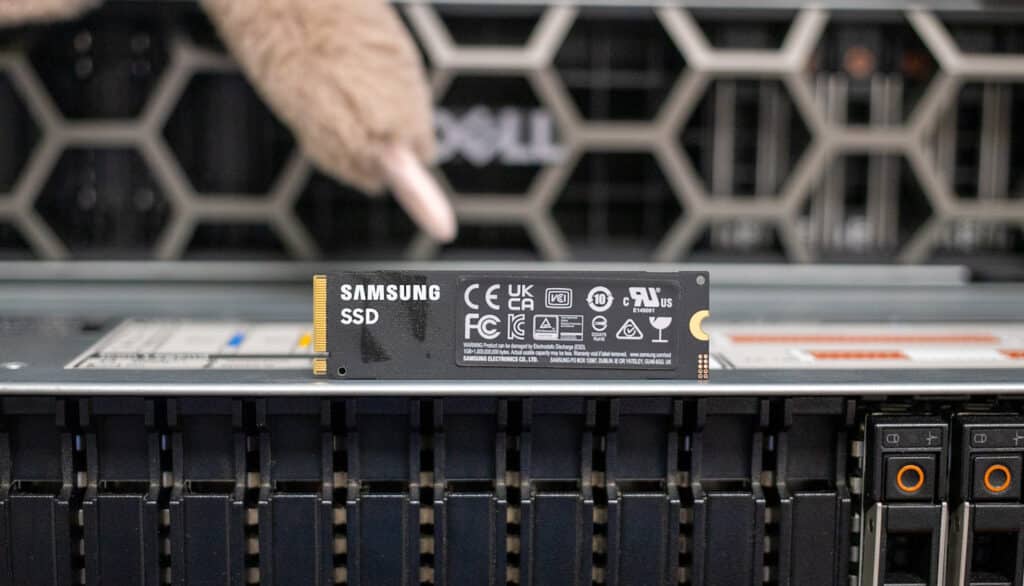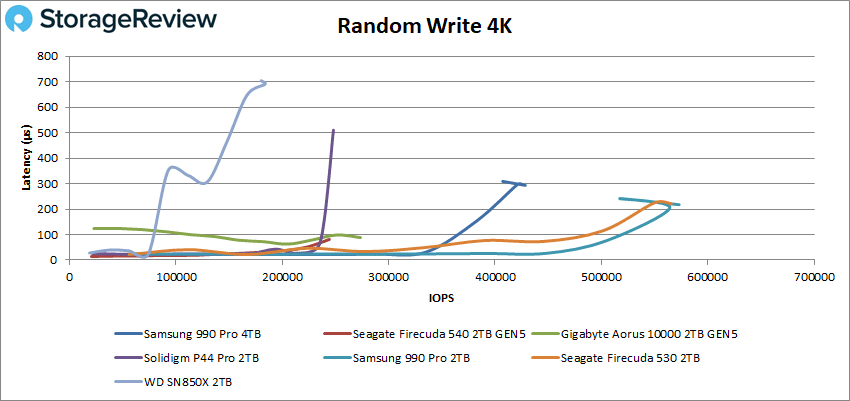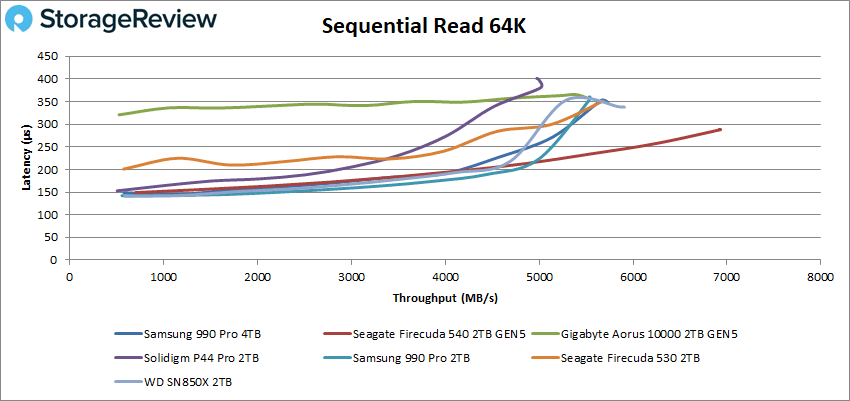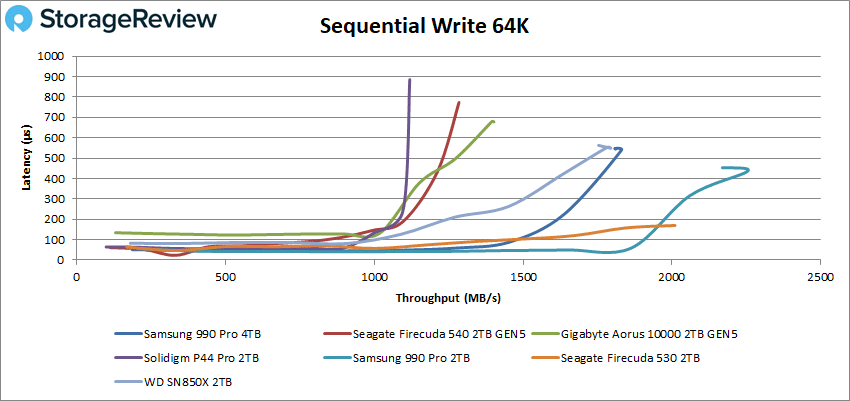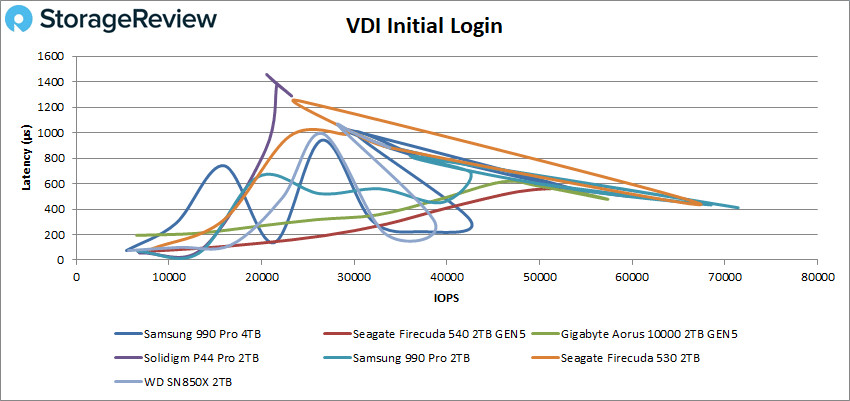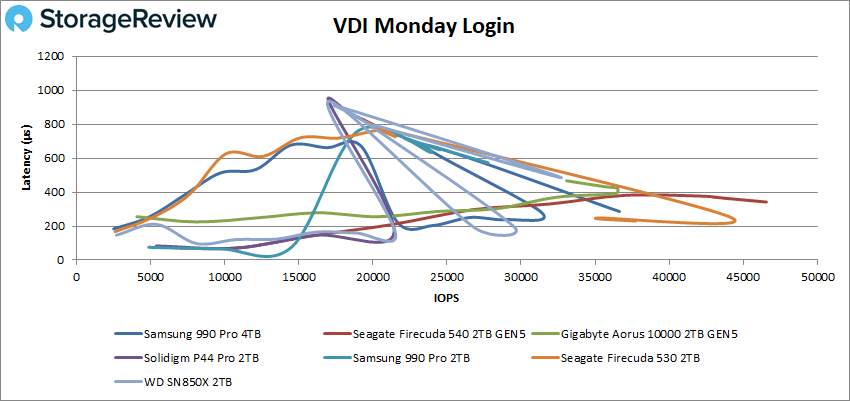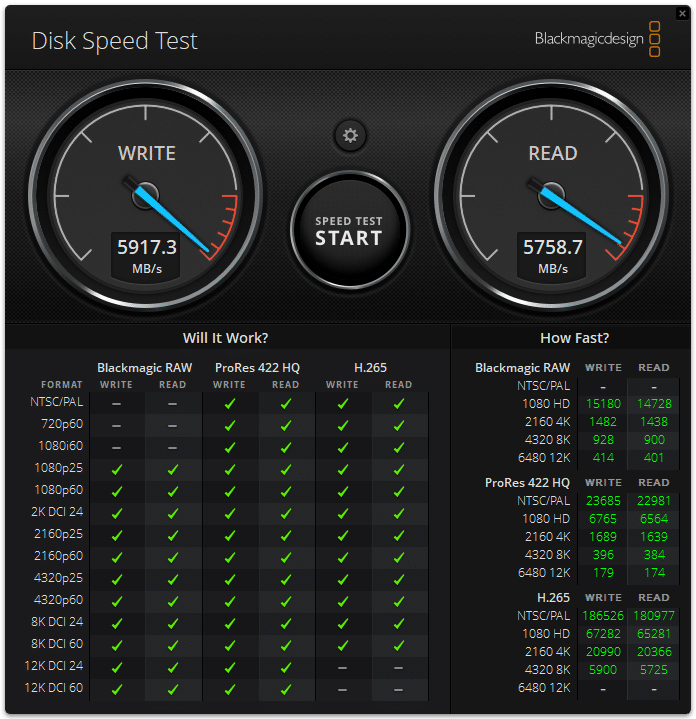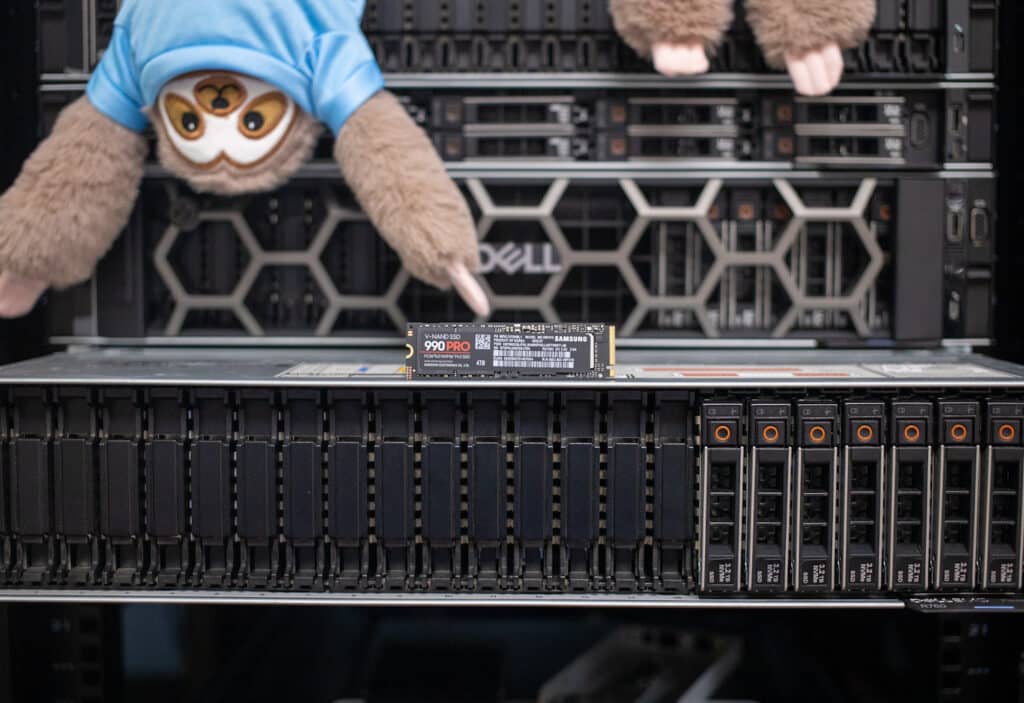Following the release of its 2TB SSD last year, Samsung has introduced the 4TB SSD to the 990 Pro series family of PCIe Gen4 SSDs. When we reviewed the Samsung 2TB 990 Pro, we noted that although it had a higher price point than some competitors, they justified the premium given the reliability and performance associated with the Samsung brand. With the Samsung 990 Pro 4TB shipping now, it’s time to see how the larger SSD holds up.
Following the release of its 2TB SSD last year, Samsung has introduced the 4TB SSD to the 990 Pro series family of PCIe Gen4 SSDs. When we reviewed the Samsung 2TB 990 Pro, we noted that although it had a higher price point than some competitors, they justified the premium given the reliability and performance associated with the Samsung brand. With the Samsung 990 Pro 4TB shipping now, it’s time to see how the larger SSD holds up.
The 4TB Pro features the same 8th-generation Samsung V-NAND technology and improved controller while targeting users with demanding workloads and needing substantial storage capacity. Overall, the 990 Pro series has proven its worth for gamers and content creators, so doubling the capacity brings more versatility.
Samsung 990 Pro 4TB: Performance and Features
The 4TB 990 Pro maintains the same performance potential as its counterparts in the series, including the 1TB and 2TB models. Specifically, it offers sequential read and write speeds up to 7,450MB/s and 6,900MB/s, respectively. For random speeds, it is expected to reach up to 1,600K IOPS read and 1,550K IOPS write.
While the core performance aspects remain constant, the 4TB model substantially increases Total Bytes Written (TBW) up to 2,400TB. Moreover, like the other capacities, the single-sided M.2 form factor makes it a versatile choice for various devices, including ultra-thin laptops.
The Samsung 990 Pro is also available in a specialized heatsink variant (we are reviewing the non-heatsink version), designed to provide enhanced thermal regulation during demanding tasks. This slim 8.2mm model comes equipped with customizable RGB lighting, controllable via Samsung’s Magician Software, adding a distinct aesthetic touch to its functionality. The heatsink is engineered to comply with PCI-SIG D8 standards, ensuring compatibility across various devices—including desktops, gaming consoles, and laptops.
Samsung 990 Pro 4TB vs The Competition
Before Samsung launched its 990 Pro 4TB model, several competitors had already made their mark in the 4TB space. Notable similarly-classed models include Seagate’s Firecuda 530 ($395), Western Digital’s WD SN850X ($281), and lower-end drives like the Predator GM7 and Fantom VENOM8. Each of these rivals offers varying degrees of performance and reliability, making Samsung’s entry a highly anticipated addition that promises to redefine industry benchmarks.
While Samsung’s 990 Pro series (and most other brands) may still need to offer an 8TB variant, the Sabrent Rocket 4 Plus is worth mentioning in this capacity segment. Although not directly comparable in every aspect, the 8TB Sabrent model provides an expansive storage solution, potentially appealing to users with significant data needs. Nevertheless, Samsung’s 990 Pro 4TB model is set to be a formidable contender in both the 4TB and broader SSD markets.
Samsung Magician Software
Samsung Magician software continues to be an essential part of the 990 PRO series, ensuring optimal SSD performance through firmware and driver updates. It also offers customization options, which we discussed in our extensive review of Samsung Magician 7. Later in October, Samsung will release Magician 8, which will feature a range of updates, improvements, and support for the 4TB 990 PRO. It is already the industry’s best SSD management toolkit in design and functionality. This will help it maintain the software’s relevance and put it even further beyond its competitors.
Samsung 990 Pro 4TB Availability
The Samsung 990 Pro 4TB (MSRP: $344.99) and 990 Pro with Heatsink (MSRP: $354.99) are backed by a 5-year warranty and are available in October. The 1TB and 2TB models of the 990 Pro series are currently available for purchase.
Samsung 990 Pro 4TB Specifications
| Interface | PCIe Gen 4.0, x4, NVMe 2.05 | ||
| Form Factor | M.2 (2280) | ||
| Storage Memory | Samsung V-NAND 3-bit TLC | ||
| Controller | Samsung In-house controller | ||
| Capacity | 1TB | 2TB | 4TB |
| DRAM | 1GB LPDDR4 | 2GB LPDDR4 | 4GB LPDDR4 |
| Sequential Read/Write Speed | up to 7,450 MB/s, up to 6,900 MB/s | ||
| Random Read/Write Speed (QD32) | up to 1,600K IOPS, 1,550K IOPS | ||
| Management Software | Samsung Magician Software | ||
| Data Encryption | AES 256-bit Full Disk Encryption, TCG/Opal V2.0, Encrypted Drive (IEEE1667) |
||
| Total Bytes Written | 600TB | 1200TB | 2400TB |
| Warranty | Five-year Limited Warranty | ||
Samsung 990 Pro 4TB Performance
For database and synthetic testing, we leverage the Lenovo ThinkSystem SR635 server, equipped with an AMD 7742 CPU and 512GB of 3200Mhz DDR4 memory. NVMe is tested natively through an edge-card slot with an M.2 to PCIe adapter card. A significant focus is put on drive latency across the entire load range of the drive, not just at the smallest QD1 (Queue-Depth 1) levels. We do this because many common consumer benchmarks don’t adequately capture end-user workload profiles. For our added BlackMagic Disk Speed Test performed in Windows, we use our self-built StorageReview desktop.
We are reviewing the 4TB version of the Samsung 990 Pro 4TB and will be comparing it to the following other consumer-grade SSDs:
- Samsung 990 Pro (2TB)
- Solidigm P44 (2TB)
- WD SN850X (2TB)
- Seagate Firecuda 530 (2TB)
- Seagate Firecuda 540 (2TB, Gen5)
- Gigabyte Aorus 10000 (2TB, Gen5)
VDBench Workload Analysis
When benchmarking storage devices, application testing is best, and synthetic testing is second. While not a perfect representation of actual workloads, synthetic tests help baseline storage devices with a repeatability factor that makes it easy to compare competing solutions. These workloads offer a range of different testing profiles ranging from “four corners” tests and common database transfer size tests to trace captures from different VDI environments.
These tests leverage the common vdBench workload generator, with a scripting engine to automate and capture results over a large compute testing cluster. This allows us to repeat the same workloads across a wide range of storage devices, including flash arrays and individual storage devices. Our testing process for these benchmarks fills the entire drive surface with data, then partitions a drive section equal to 1% of the drive capacity to simulate how the drive might respond to application workloads. This differs from full entropy tests that use 100 percent of the drive and take them into a steady state. As a result, these figures will reflect higher-sustained write speeds.
Profiles:
- 4K Random Read: 100% Read, 128 threads, 0-120% iorate
- 4K Random Write: 100% Write, 64 threads, 0-120% iorate
- 64K Sequential Read: 100% Read, 16 threads, 0-120% iorate
- 64K Sequential Write: 100% Write, 8 threads, 0-120% iorate
Starting with 4k random read, the 4TB 990 Pro demonstrated solid performance, with a peak of one million IOPS at a latency of 125.9µs, trailing the Solidigm P44 Pro (2TB) but showed slight improvement over the 2TB 990 Pro model, peaking at 961K IOPS.
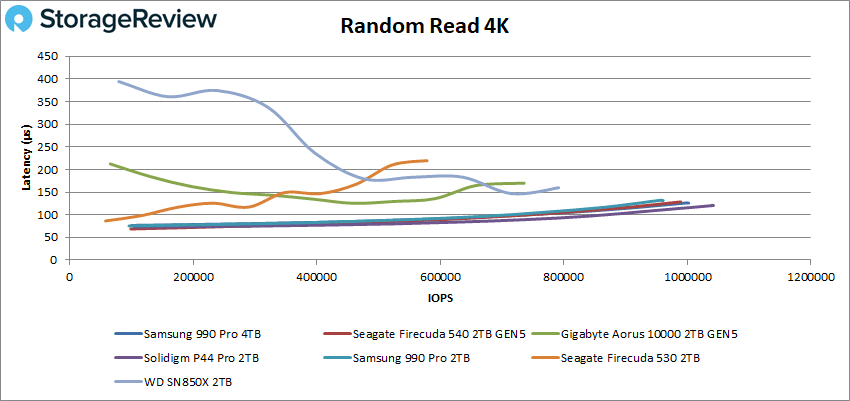
When looking at sequential reads, the 4TB 990 Pro had a peak throughput of 5.69GB/s read with a latency of 348µs for 3rd place among the competition and slightly better than the 2TB model.
In sequential writes, the 4TB 990 Pro trailed again, peaking at 1.83GB/s with a latency of just 539µs, compared to the 2TB model and top performer with a peak of 2.25GB/s.
Next, we looked at our VDI benchmarks, designed to tax the drives further. These tests include Boot, Initial Login, and Monday Login. The 4TB 990 Pro has mixed results with these workloads. Starting with Boot, the 4TB 990 Pro performed poorly, ending the test at 68K IOPS (at 502µs). The 2TB model had slightly better results here.
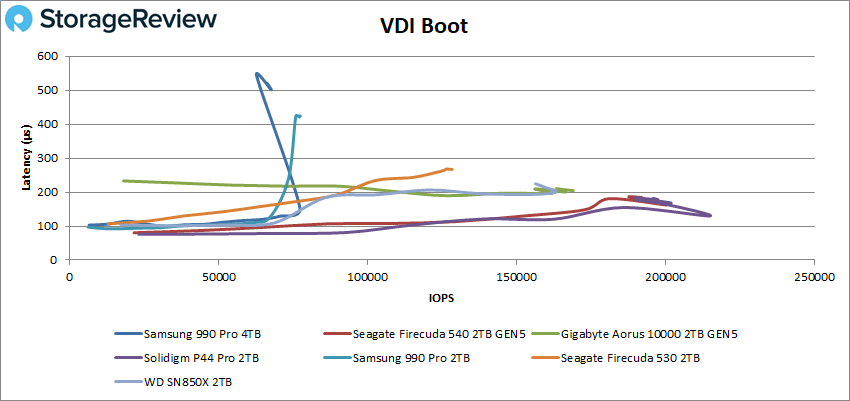
Finally, the VDI Monday Login benchmark is where the 4TB 990 Pro placed third with a peak of 37K IOPS and 286.2ms. This was noticeably better than the 2TB model.
Blackmagic Disk Speed Test
We measured performance inside a Windows 11 environment on our consumer test platform via the popular Blackmagic test. The Samsung 990 Pro 4TB hit 5,917.3MB/s write and 5,758.7GB/s write.
These results were similar to the 2TB model (5,943 write and 5,671MB/s read), though the smaller capacity showed better write performance.
BootBench
BOOT-BENCH-1 is a workload profile adopted by OCP to profile SSDs designed for server boot duty. While this is intuitively a job for enterprise SSDs, client SSDs are often selected for their performance, capacity, and cost combination. The boot drive issue is germane to hyperscalers and server and storage system providers, as they face similar challenges.
This boot workload executes a relatively intense test plan that fills the entire drive with writes before testing a read-heavy workload sequence. For each test, it performs a 32K random read async operation alongside a 15MiB/s synchronous 128k random write and a 5MiB/s synchronous 128k random write/trim background workload. The script starts with the random-read activity at a 4-job level and scales up to 256 jobs at its peak. The final result is the read-operations performed during its peak run.
The OCP goal for this benchmark is a pass/fail at 60K read IOPS. Most drives we test will far exceed the minimum, but the results are instructive regardless.
Here, the 4TB Samsung 990 Pro shows pretty good results at 188,544 IOPS, placing it right in the middle of our SSD Bootbench leaderboard. This score was slightly better than the 2TB model (roughly 7%).
| SSD | Read IOPS |
| Sk hynix Platinum P41 | 220,884 IOPS |
| WD SN850X | 219,883 IOPS |
| Solidigm P44 Pro | 211,999 IOPS |
| Fantom VENOM8 | 190,573 IOPS |
| Samsung 990 Pro (4TB) | 188,544 IOPS |
| Samsung 990 Pro (2TB) | 176,677 IOPS |
| Sabrent Rocket 4 Plus | 162,230 IOPS |
| Predator Storage GM7 | 35,302 IOPS |
| ADATA Legend 970 | 65,632 IOPS |
Conclusion
The introduction of the Samsung 990 Pro 4TB SSD marks another milestone in the company’s commitment to providing high-quality, reliable storage solutions. The 4TB variant offers notable features like increased TBW up to 2,400TB and support for the Samsung Magician software. The single-sided M.2 form factor adds versatility for installation in smaller systems like consoles and ultra-thin laptops.
The 4TB model appeals to the same high-performance user base as the 2TB version, accommodating demanding workloads from gaming to content creation. The 4TB variant distinguishes itself by catering to users who require additional storage, whether for larger game libraries or more extensive creative projects.
The 4TB 990 Pro demonstrated marginal improvements in IOPS random reads, peaking at one million IOPS, a slight but noteworthy advantage over the 2TB model, but falls behind when it comes to write speeds. Despite these disparities, both models maintain high overall sequential read and write speeds, making them strong competitors in their respective market segments.
With an MSRP of $344.99, the Samsung 990 Pro 4TB is priced $50 less than Seagate’s Firecuda 530 and $70 more than Western Digital’s WD SN850X. Pricing is dynamic though, and the 990 Pro’s price should fall as it gets into the market. Available this October and backed by a five-year warranty, this model also comes with an optional heatsink variant for enhanced thermal regulation.
Although the Samsung 990 Pro 4TB has slight disadvantages in write speeds compared to its 2TB predecessor, the increased storage capacity, usual robust feature set, and support from the upcoming Samsung Magician 8 software make it a formidable contender in both the 4TB and broader SSD markets, especially if as the price gets closer to $300.
Engage with StorageReview
Newsletter | YouTube | Podcast iTunes/Spotify | Instagram | Twitter | TikTok | RSS Feed

